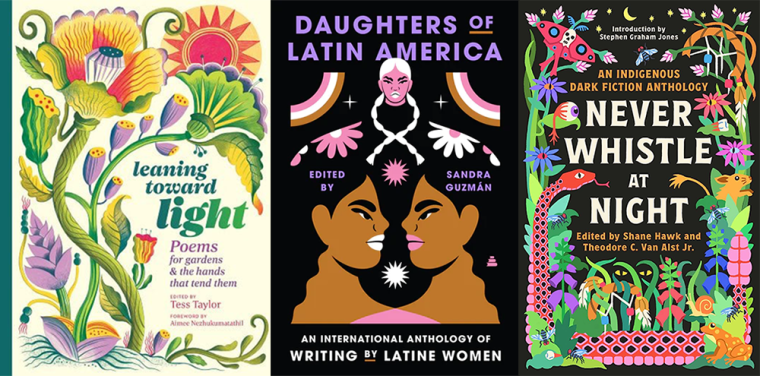Among the many new books published each season is a shelf full of notable anthologies, each one showcasing the work of writers united by genre, form, or theme. The Anthologist highlights a few recently released or forthcoming collections, including Never Whistle at Night: An Indigenous Dark Fiction Anthology (Vintage, September 2023).

After a summer rife with extreme weather events—Canadian wildfires big enough to darken U.S. skies, floods, extreme heat—readers could use a reminder that a more caring relationship with Earth is possible. They will find it in Leaning Toward Light: Poems for Gardens & the Hands That Tend Them (Storey Publishing, August 2023), which offers a lush bouquet of verse by authors exploring what it means to garden “when the natural world is collapsing, and where...we have not yet managed to cultivate widespread abundance, nourishment, or peace,” as editor Tess Taylor writes in her introduction. Setting the tone for the collection is Ross Gay’s now-famous lyric “A Small Needful Fact,” which considers the tragic irony that Eric Garner—who was killed in 2014 by a New York City police officer’s chokehold—worked in horticulture and therefore made “it easier / for us to breathe.” Jericho Brown remembers the morning glories that his mother grew in “Foreday Morning,” Mark Doty compares weeding to a way of fighting existential dread in “Deep Lane,” and Jenny Xie counts the ways a garden “sets off the mind’s tripwires” in an excerpt from “Tending,” among other hearty selections. At the start of each section, an author offers a prose meditation and a recipe, such as Jane Hirshfield’s braised fava beans. Bright illustrations of curling green tendrils and pink and purple buds make the collection a feast for the eyes as well as the mind. As Aimee Nezhukumatathil reminds readers in her foreword: “[T]he word anthology means a ‘gathering of flowers.’ ... How perfect, then, to have this gathering, this flowering, of poems, about the connection of hand to earth.”
Among the most culturally diverse regions of the world, Latin America is home to hundreds of spoken languages and a political sphere shaped by wars dating to fifteenth century Spanish colonization, creating a far-flung diaspora. This complexity is reflected in the pages of Daughters of Latin America: An International Anthology of Writing by Latine Women (Amistad, August 2023). Editor Sandra Guzmán has assembled forty-one Latine contributors, including nonbinary and cis and trans women authors from thirty-four nations across hundreds of years, from Sor Juana Inés de la Cruz, who wrote in late seventeenth century Mexico, to Ada Limón, the current poet laureate of the United States. Organized in thirteen sections corresponding to the thirteen moons of the Mayan calendar, the anthology offers a surprising mix of stories, poems, letters, speeches, songs, and other texts meant to counter stereotypes about Latin America, replace a patriarchal view of the region’s literary tradition with a matriarchal one, and “disrupt erasure,” Guzmán writes in her introduction. Readers will find a love letter from Chilean poet and Nobel laureate Gabriela Mistral to her partner Doris Dana (translated from the Spanish by Velma García-Gorena), Claribel Alegría’s elegy for her war-town homeland of El Salvador (translated from the Spanish by Carolyn Forché), a personal history of life under Spanish colonial rule in Colombia by Indigenous memoirist and activist Berichá (translated from the Spanish by Guzmán), and many more selections that put the personal in conversation with the political. The volume also serves as a testament to “the necessity and urgency of the power of women to write, write, write, and to leave a trace that we were once here,” writes Guzmán.
For Indigenous authors in the United States, the horror genre can speak both to the ghastly reality of colonial violence and a sense of the world as a place of mystery beyond human understanding: “It feels kind of fake and wrong and all too American to throw up walls between what’s real and what’s maybe not real,” writes Stephen Graham Jones in his foreword to Never Whistle at Night: An Indigenous Dark Fiction Anthology (Vintage, September 2023). Edited by Indigenous authors Shane Hawk and Theodore C. Van Alst Jr., the volume collects macabre tales by the editors themselves and contributors including Tommy Orange, Rebecca Roanhorse, Morgan Talty, and others who take readers “into the darkness at the heart of—let me put some quotation marks around it—‘America,’” Graham writes. In “Kushtuka” by Mathilda Zeller, a young Indigenous woman has reached a turning point in a fraught relationship with a rich white man when they encounter the eponymous shapeshifting creature; in “Navajos Don’t Wear Elk Teeth” by Conley Lyons, an Indigenous man finds himself both attracted to and repelled by a handsome blond neighbor whose entitled behavior turns menacing; in “Wingless” by Marcie R. Rendon, an Indigenous girl in foster care wonders what to make of one of her housemate’s collection of jarred bugs and human hair. The anthology invites all readers to question the line between the natural and supernatural, but it offers a particular proposition for non-Indigenous readers: “Why you don’t come over here into the dark with us, into that other land? We can show you a thing or two, maybe,” writes Jones.









